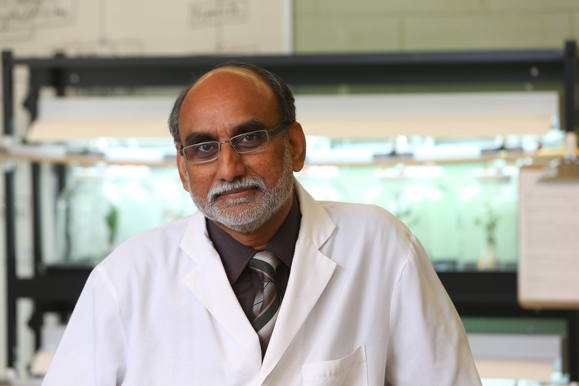
It wasn’t just your mother telling you to eat carrots for better vision. People have known for centuries that certain foods can be good for your eyesight. A diet rich in beta-carotene, carotenoids and antioxidants may reduce the risk of developing macular degeneration and slow the progression of the disease in those already diagnosed.
 Carrots, a member of the parsley family, are one of the rare vegetables which are more nutritious cooked than raw and are consumed by Canadians at a rate of 10 – 15 million pounds per year!
Carrots, a member of the parsley family, are one of the rare vegetables which are more nutritious cooked than raw and are consumed by Canadians at a rate of 10 – 15 million pounds per year!
Dr. Raj Lada, on Dalhousie’s Agricultural Campus, founded the Processing Carrot Research program to enhance yield, quality, sustainability and stress tolerance of this hardy vegetable. He and his team have studied fields of carrots around the province of Nova Scotia, New Brunswick and Prince Edward Island.
"Our processing carrots research program has transformed carrot production in the region and made Nova Scotia the number one Individually Quick Frozen (IQF) producer in Canada and number two in north America,” explained Dr. Raj Lada. “This is a great example of how scientific research and innovative technologies can transform an industry," he believes.
 Major discoveries of the program include pest and disease resistant varieties for various carrot products, seed pre-treatments, nutritional optimization, plant growth regulators that inhibit drought stress, carrots that can adjust well under nutrient deficient environments and agro informatics to predict crop yields to name a few.
Major discoveries of the program include pest and disease resistant varieties for various carrot products, seed pre-treatments, nutritional optimization, plant growth regulators that inhibit drought stress, carrots that can adjust well under nutrient deficient environments and agro informatics to predict crop yields to name a few.
The carrot, which is in the top 10 of the most economically important global vegetable crops, is not only orange in color, but also comes in purple, white, red and yellow varieties.
Working with Horticulture Nova Scotia, Dr. Lada established a Research Chair position for Carrots and an Edible Horticulture Research program at the Faculty of Agriculture which has expanded to address the needs of the Rhubarb industry.
Faculty of Agriculture
Agricultural Campus
PO Box 550
Truro, NS, B2N 5E3
1.902.893.6600
Dalhousie University
Halifax, Nova Scotia, Canada B3H 4R2
1.902.494.2211